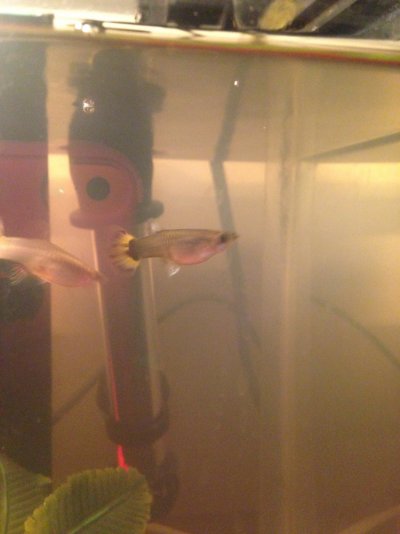Andy Sager
Aquarium Advice Addict
I'm sure we have all seen this header on a lot of threads. It's a common question by new or newer aquarists first keeping fish. Thanks to the folks at Tropical Fishkeeping.com, I'd like to share their post so that we can clear up this question once and for all. 
"We need to give a little insight on the difference of a terminology here. I have seen many post saying, "My fish is pregnant." . Well, this may or may not be true. First of all, egg layers cannot become pregnant. Have you ever heard of a pregnant chicken? I have not. Egglayers, fish that either lay or scatter eggs include cichlids, danios, rasboras, goldfish, tetras, catfish, and anabatids, become gravid. That is they become full of eggs which are laid and fertilized externally.
Livebearers, on the other hand, become pregnant. The eggs are fertilized internally inside of the female by the male. The young are born alive and are free swimming in a short period of time. Fish that can be termed as pregnant include guppies, mollies, swordtails, platys, pike livebearers, and a few others that don't come to mind at this moment. ( I'll add Endler's Livebearers to this list.)
So, when you post about your fish, you now know the proper terminology."
And to further answer the next questionyou are probably thinking, if your fish does become gravid, there is nothing you HAVE to do for it. Fish can go an entire lifetime without breeding and just carry or reabsorb their eggs over time. So unless you are actually trying to breed your fish, there is no need to be concerned if your fish is gravid. Just enjoy their plumpness.
Hopefully, this will end the multiple threads of "is my Tetra, Barb, Danio, Gourami, etc. pregnant?" The answer is always going to be "NO, they are not." If you are not sure if your fish is a livebearer, ask your salesperson when you buy them. If they don't know, that should be a clear indication that you shouldn't be buying your fish from there. They should know this the day they started working. (IMO)
Okay, class dismissed. Go enjoy your fish now.
PS: This thread is not intended to insult or demean anyone who has posted this question but to educate all on the subject of proper fish terminology.
"We need to give a little insight on the difference of a terminology here. I have seen many post saying, "My fish is pregnant." . Well, this may or may not be true. First of all, egg layers cannot become pregnant. Have you ever heard of a pregnant chicken? I have not. Egglayers, fish that either lay or scatter eggs include cichlids, danios, rasboras, goldfish, tetras, catfish, and anabatids, become gravid. That is they become full of eggs which are laid and fertilized externally.
Livebearers, on the other hand, become pregnant. The eggs are fertilized internally inside of the female by the male. The young are born alive and are free swimming in a short period of time. Fish that can be termed as pregnant include guppies, mollies, swordtails, platys, pike livebearers, and a few others that don't come to mind at this moment. ( I'll add Endler's Livebearers to this list.)
So, when you post about your fish, you now know the proper terminology."
And to further answer the next questionyou are probably thinking, if your fish does become gravid, there is nothing you HAVE to do for it. Fish can go an entire lifetime without breeding and just carry or reabsorb their eggs over time. So unless you are actually trying to breed your fish, there is no need to be concerned if your fish is gravid. Just enjoy their plumpness.
Hopefully, this will end the multiple threads of "is my Tetra, Barb, Danio, Gourami, etc. pregnant?" The answer is always going to be "NO, they are not." If you are not sure if your fish is a livebearer, ask your salesperson when you buy them. If they don't know, that should be a clear indication that you shouldn't be buying your fish from there. They should know this the day they started working. (IMO)

Okay, class dismissed. Go enjoy your fish now.
PS: This thread is not intended to insult or demean anyone who has posted this question but to educate all on the subject of proper fish terminology.


